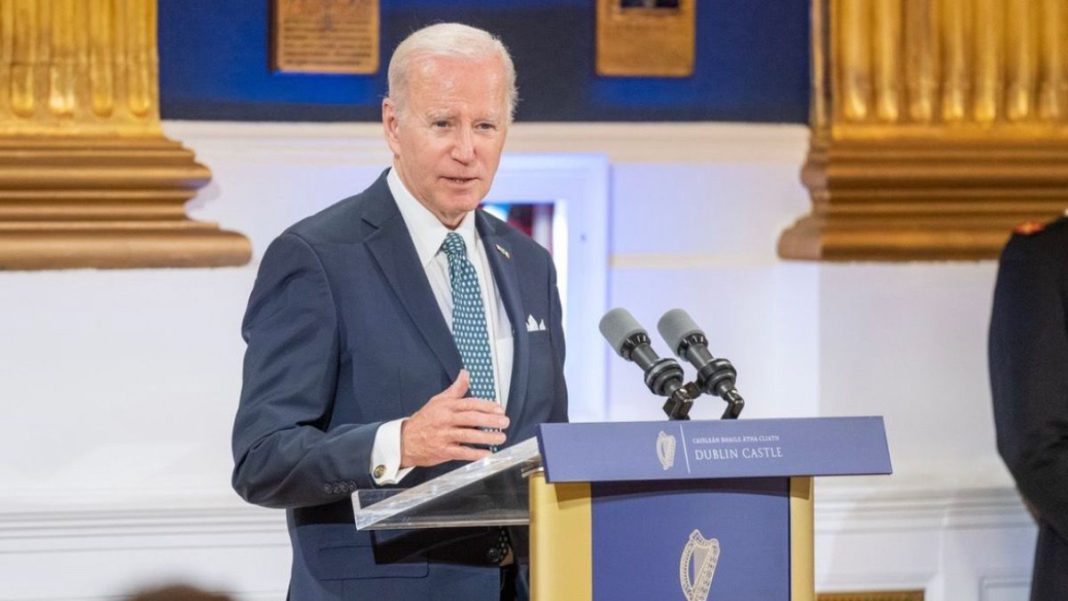UNITED STATES: Democratic President Joe Biden and a Republican negotiator stated on Friday that they were working on a compromise to increase the US government’s $31.4 trillion debt ceiling, following a warning from the Treasury Department that a June 5 default loomed in the absence of action.
The federal government’s self-imposed borrowing ceiling has been the subject of weeks of negotiations between the two sides, with Republicans also demanding significant spending cuts. The United States might experience a catastrophic default if there is no agreement.
Biden told reporters, “Things are looking good. I’m optimistic.” Patrick McHenry, a Republican representative, agreed with Biden’s remarks but warned that talks had not yet concluded.
McHenry, one of House Speaker Kevin McCarthy’s top negotiators with the White House, said, “I’m hopeful. But we have to make sure we have a line on tax and a line on the agreement—there are significant challenges ahead.”
The two spoke separately soon after US Treasury Secretary Janet Yellen stated that the government would not have enough money on hand on June 5 to pay its payments. The updated projection gave more time but a stricter ultimate deadline because Yellen had earlier stated that the date might occur as early as June 1.
Negotiators are working on a deal that would lift the limit for two years, but they can’t agree on whether to toughen the job requirements for key anti-poverty programmes.
McCarthy departed the Capitol on Friday after a conference call during which one of his closest advisers informed other Republicans that no deal had been struck, as reported by the media.
The Republican-controlled House and the Democratic-led Senate would both need to approve a deal before Biden could sign it into law, a process that might take more than a week.
A US official claims that negotiators have achieved a tentative deal that would put a cap on the amount of money that the government will spend on various programmes next year.
The safety-net programmes continued to be a problem. Republican leader Garret Graves said his side would not budge on its demand that more people be employed. “Hell no. Not a chance,” Graves told journalists.
Biden and his fellow Democrats have fought Republican efforts to make it necessary for childless persons under the age of 56 to demonstrate that they are employed or actively seeking employment in order to be eligible for the Medicaid health plan and the SNAP food assistance programme.
The Republican proposal would make it more necessary for participants in those programmes to demonstrate that they are employed or looking for employment. According to the impartial Congressional Budget Office, this would result in savings of $120 billion over ten years but would also drive more than a million Americans out of such programmes.
Democrats claim that the proposal will just create more red tape, which will exclude many who would otherwise be eligible.
Medicaid and SNAP have decreased in recent months after significantly increasing during the COVID-19 outbreak. Biden, particularly, has battled Medicaid’s work requirements, which as of January, covered 85 million Americans.
According to the official, who spoke on the condition of anonymity, the proposed agreement would raise financing for the military and veterans’ care while virtually maintaining current-year levels of non-defence discretionary spending.
The agreement may potentially reduce money for the Internal Revenue Service, which received an additional $80 billion in the budget last year, partly to strengthen enforcement and increase tax revenue. Republican lawmakers have pushed to revoke that funding.
The official stated that the White House is attempting to maintain its push to target rich taxpayers. The Treasury Department has already issued a warning that it might not be able to pay all of its commitments as early as June 1.
The United States has reportedly been reviewed by several credit rating agencies for a potential downgrade, which would increase borrowing rates and diminish its status as the backbone of the global financial system.
A similar dispute in 2011 prompted Standard & Poor’s to lower its assessment of US debt.
Even if they reach an agreement, party leaders will have to work hard to secure enough support in Congress. Democrats have opposed the increased work requirements for assistance programmes, while right-wing Republicans have stressed that any agreement must include significant spending cutbacks.
However, congressional leaders have instructed them to be prepared to return for voting when a deal is reached. The majority of legislators have already left Washington for the Memorial Day holiday.
Before a vote, members will have three days to consider the agreement, according to House leaders. In the Senate, a single senator has the authority to stall proceedings for several days. At least one, Republican Mike Lee, has threatened to do so.
Also Read: Criminal Trial of Trump Scheduled for March 2024, Coinciding with Full-Swing Campaign Season



